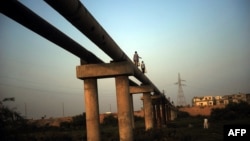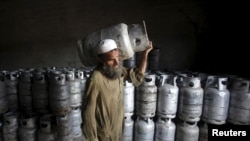Russian President Vladimir Putin is expected to visit Pakistan in the coming months to inaugurate a gas pipeline project in which Russia will investing billions of dollars.
Pakistan’s Prime Minister Nawaz Sharif already has sent an invitation and Russia has shown willingness to send its head of state, according to Mobin Saulat, the CEO and managing director of Inter State Gas Systems, the Pakistani company handling the project.
“Maybe before June,” Saulat said hopefully, referring to Putin's arrival.
Saulat attributed Russian interest in this project to changing regional dynamics, both political and economic.
“We are 200 million people. And we provide a gateway to other South Asian countries,” he said.
Energy officials meet
As a sign of Russian interest, he pointed out that Pakistani officials and energy experts, on a recent Moscow trip, were able to meet the heads of Russian energy giants Gazprom, Rostec, and Rosneft for the first time in more than two decades.
Russia also wants to supply liquid natural gas to Pakistan. Saulat said in time Pakistan should expect to import 4 million tons per annum of LNG from Russia. Pakistan recently signed a deal with Qatar to provide a similar amount.
Economic incentives apart, both sides might have strategic and political motives for working together on this project.
Pakistan has been trying to form new regional partnerships to diversify from its heavy reliance on the U.S. and China. Russia likely views the deal as an opportunity to expand its influence in key areas of South and Central Asia.
“There’s a great deal of thinking that this has more geopolitical underpinnings rather than commercial ones,” said Khurram Hussain, a business and economy journalist, and a former Pakistan scholar at Washington-based think tank Woodrow Wilson Center.
He sounded doubts, however, about the pace of the project.
“I take agreements that have been signed in a veil of secrecy with a great deal of skepticism,” said Hussain, adding that if the government wanted to start the project in a few months, now would be the time to let analysts review the terms and conditions.
Boosting Pakistan's economy
He acknowledged that the deal, if it goes through, would be good for Pakistan.
“Pakistan is in dire need for foreign investment in infrastructure and the only parties that are willing to step forward thus far have been other states, particularly China,” he said.
While the current venture is a state-to-state project, it might give a signal to the private sector that Pakistan’s economy has powerful backers.
Russia will spend from $2 billion to $2.5 billion, which is almost 85 percent of the cost of building the pipeline.
The 1,100-kilometer-long structure will be able to transport 1.2 billion cubic feet of gas per day throughout Pakistan, from Karachi to Lahore. The first phase of the three-phase project is expected to come online in two years, with the final completion date scheduled for some time in 2019. LNG, from any country that comes to Karachi port will be re-gasified and sent through this pipeline to the north.
In time, the pipeline will help replace the aging infrastructure currently used to transport gas within Pakistan.
Russian involvement
Pakistan initially approached China, Russia, and Qatar for the financing of the project and received favorable responses from all. In the end, the government opted for Russia in order to diversify its regional partnerships.
Saulat said the Russians “immediately responded.” Russia already has sent teams to survey the route and is in the process of designing the project.
Russian Energy Minister Alexander Novak and his Pakistani counterpart Shahid Khaqan Abbasi signed the agreement when Novak visited Islamabad in October.
Saulat expects the deal to usher in a new era of Russian investment in Pakistan. “In the next few months you’ll see more and more Russian delegations coming in,” he said.













